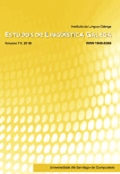
Estudos de Linguistica Galega
Scope & Guideline
Fostering Collaboration in Galician Language Studies
Introduction
Aims and Scopes
- Linguistic Structure and Syntax:
Explores the grammatical frameworks and syntactic structures of Galician, Portuguese, and other Iberian languages, contributing to an understanding of language mechanics. - Sociolinguistic Dynamics:
Examines the social aspects of language use, including language transmission and code-switching, particularly in the context of Galician and its interaction with Spanish and Portuguese. - Language Variation and Change:
Investigates dialectal variations and historical changes within Iberian languages, focusing on phenomena such as metaphony and auxiliary verb usage. - Language Education and Policy:
Assesses the implementation and effectiveness of language policies in educational settings, particularly regarding the promotion of Standard Galician. - Comparative Linguistics:
Conducts comparative analyses between Galician and other Iberian languages, enhancing the understanding of linguistic features across related languages.
Trending and Emerging
- Syntactic Analysis of Contemporary Usage:
Recent publications emphasize the syntax of contemporary Portuguese and Galician, showcasing an increasing interest in how these languages are used in modern contexts. - Language Contact and Code-Switching:
There is a growing focus on the dynamics of language contact, particularly the role of code-switching among bilingual speakers, highlighting the complexities of language use in multilingual environments. - Educational Linguistics:
The examination of language education, particularly the implementation of Galician in educational systems, is gaining traction, reflecting societal interests in language preservation and revitalization. - Technology in Linguistics:
The application of technology in linguistic research, such as automatic language generation tools, is emerging as a significant theme, indicating a trend towards integrating computational methods in linguistic analysis. - Variationist Approaches:
A notable increase in variationist studies, particularly regarding the use of auxiliary verbs and inflected forms, suggests a deepening interest in understanding linguistic variation within specific language communities.
Declining or Waning
- Untitled and Incomplete Studies:
The presence of multiple untitled papers in recent issues suggests a lack of focused research output or incomplete studies, indicating a potential waning of structured contributions in some areas. - Historical Linguistics:
Though historical linguistics remains a significant aspect of the journal's scope, recent publications show a reduced focus on long-term language evolution, with fewer studies comparing historical changes across languages. - Morphological Studies:
Research on morphological aspects, particularly concerning inflection and derivation, seems to be less frequent, indicating a possible shift towards more syntactic and sociolinguistic themes.
Similar Journals

Turkic Languages
Navigating the Intricacies of Turkic Language StudiesTurkic Languages is an esteemed academic journal published by HARRASSOWITZ VERLAG, dedicated to the exploration and analysis of Turkic languages within the broader fields of linguistics and language studies. With an ISSN of 1431-4983, this journal serves as a vital platform for researchers, professionals, and students interested in the intricate structures, dynamics, and cultural contexts of Turkic languages. Although it currently operates without an Open Access option, the journal's commitment to quality research is evident in its placement within the Q4 category of Linguistics and Language for 2023, alongside its Scopus rankings where it stands in the 30th and 26th percentiles for Language and Linguistics across Arts and Humanities and Social Sciences, respectively. The journal's scope encompasses a variety of linguistic phenomena, striving to foster a deeper understanding of Turkic languages and their significance in the global linguistic landscape. With converged years from 2017 to 2022, Turkic Languages continues to uphold its reputation as a crucial resource for advancing scholarship in this specialized field.
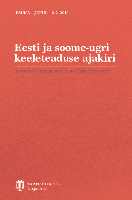
Eesti ja Soome-Ugri Keeleteaduse Ajakiri-Journal of Estonian and Finno-Ugric Linguistics
Bridging Academic Excellence in Language StudiesEesti ja Soome-Ugri Keeleteaduse Ajakiri - Journal of Estonian and Finno-Ugric Linguistics is a premier academic journal published by UNIV TARTU PRESS, dedicated to advancing the field of linguistics with a particular focus on the Estonian and Finno-Ugric languages. Since its inception, the journal has embraced an Open Access publishing model, allowing researchers and enthusiasts to freely explore its groundbreaking studies and findings since 2013. With an Impact Factor that places it in the Q3 quartile of leading journals within the linguistic domain, it serves as a vital platform for the dissemination of new research and theoretical advancements. Ranked 410th out of 1088 journals in the Arts and Humanities category for Language and Linguistics, it reflects a robust commitment to quality scholarship that appeals to academics, professionals, and students alike. Operating from Tartu, Estonia, the journal aims to foster greater understanding and appreciation of the Estonian language within the broader context of Finno-Ugric studies, making it an essential resource for anyone interested in these unique linguistic cultures.

Dialectologia
Fostering Global Dialogue in Linguistic ResearchDialectologia, published by the Universidad de Barcelona, Facultad de Filología, is a distinguished academic journal dedicated to the fields of linguistics and language studies. Since its inception in 2008, this Open Access journal has made significant strides in disseminating knowledge, fostering scholarly communication, and promoting research in dialectology and sociolinguistics. With its current classification in the Q3 quartile of linguistics and language, and Scopus rankings placing it in the 32nd and 29th percentiles within the Arts and Humanities and Social Sciences, respectively, Dialectologia plays a crucial role in advancing the study of language variation and change. The journal’s commitment to providing a platform for innovative research is underscored by its accessibility to a wide audience, ensuring that researchers, professionals, and students alike can engage with and contribute to contemporary discourse in language studies. Based in Barcelona, Spain, Dialectologia not only enriches academic literature but also connects a global community of language scholars through its compelling and diverse contributions.
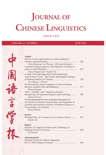
JOURNAL OF CHINESE LINGUISTICS
Fostering Interdisciplinary Dialogue in Chinese LinguisticsJOURNAL OF CHINESE LINGUISTICS, published by the JOURNAL CHINESE LINGUISTICS, is a prominent periodical that serves as a vital resource for researchers and scholars in the fields of linguistics and Chinese studies. With its ISSN 0091-3723, this journal has been contributing to the academic community since 1996 and continues to publish innovative research until 2024. Although it is classified in the third quartile (Q3) for both Arts and Humanities and Linguistics categories, its focus on Chinese linguistics positions it uniquely within this specialized domain. The journal is committed to advancing the understanding of Chinese language structures, usage, and context, encouraging interdisciplinary dialogue among linguists and language researchers. While currently not labeled as open access, the journal remains accessible to institutions and scholars worldwide, creating an invaluable platform for disseminating knowledge. As such, it plays a critical role in promoting linguistic diversity and cultural awareness within the academic landscape.

Linguistica e Filologia
Advancing Linguistic Scholarship, Bridging Cultures.Linguistica e Filologia is a prominent academic journal published by UNIV DEGLI STUDI BERGAMO that offers an Open Access platform since 2002, fostering scholarly communication in the fields of linguistics, philology, and comparative literature. With a commitment to advancing understanding in these disciplines, the journal serves as a vital resource for researchers, professionals, and students alike. Its content encompasses diverse theoretical and empirical studies, critiques, and analyses of language and literature, encouraging interdisciplinary dialogue. Hosted in the picturesque city of Bergamo, Italy, the journal aims to bridge gaps between historical and contemporary linguistic practices, enhancing the global discourse on language studies. With a focus on quality, transparency, and accessibility, Linguistica e Filologia plays a crucial role in shaping the future of linguistic scholarship and is an invaluable reference for anyone interested in the intricate relationships between language and culture.

Language and Linguistics Compass
Exploring the Frontiers of Linguistic KnowledgeLanguage and Linguistics Compass, published by Wiley, stands as a premier journal in the field of linguistics, showcasing innovative and interdisciplinary research. With its ISSN 1749-818X and E-ISSN matching, the journal has built a robust reputation, achieving an impressive Q1 ranking within the linguistics category for 2023, placing it in the top 4% of its field. Its Scopus rank of 48 out of 1167 highlights its influence and significance among linguistics journals, boasting a commendable 95th percentile. This journal serves as a vital resource for researchers, professionals, and students, offering a wide range of accessible articles that illuminate current trends and advances within the domain of language studies. Although it is not Open Access, the journal is committed to quality and diversity in its publications, ensuring scholarly articles from various sub-disciplines of linguistics are represented from 2008 through 2024. Located in the United Kingdom, Language and Linguistics Compass invites contributions from around the globe, reinforcing its status as a leading forum for linguistic discourse.
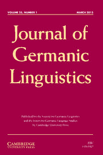
Journal of Germanic Linguistics
Pioneering Research in Syntax, Semantics, and PhonologyThe Journal of Germanic Linguistics, published by Cambridge University Press, is a premier academic journal dedicated to advancing scholarship in the field of linguistics with a particular focus on Germanic languages. With an impressive impact factor and a well-established reputation, this journal attracts contributions from leading researchers and professionals who delve into the complexities of language, syntax, semantics, and phonology. The journal holds a prominent position in its category, recognized as Q2 in Linguistics and Language and Q1 in Literature and Literary Theory according to latest rankings. By fostering innovative research, the Journal of Germanic Linguistics plays a crucial role in shaping the discourse around Germanic linguistics, providing an essential platform for both emerging scholars and seasoned academics alike. Although it does not offer Open Access options, it continues to be a vital resource for the global academic community, with a convergence of works published throughout its history from 2001 to 2007 and again from 2009 to 2024, ensuring an enriching repository of research for future generations.

Cuadernos de Linguistica Hispanica
Championing Quality Research in Hispanic LinguisticsCuadernos de Linguistica Hispanica is a distinguished open access journal published by UNIV PEDAGOGICA & TECNOLOGICA COLOMBIA, dedicated to advancing research in the field of linguistics and language studies since its inception. With an ISSN of 0121-053X and E-ISSN 2346-1829, this journal has established itself as an important platform for scholars to share innovative findings and insights within the linguistics community. As a Q3-ranked journal in linguistics and language according to 2023 category quartiles, it occupies a significant position in Scopus rankings, showcasing its commitment to quality and relevance. With the aim to foster scholarly discourse and promote understanding of the Hispanic linguistic landscape, the journal welcomes contributions that explore a diverse range of topics and methodologies. The journal has embraced open access since 2008, ensuring that research is accessible to a broader audience, thus enhancing its impact and engagement within both academic and professional spheres.

NEUPHILOLOGISCHE MITTEILUNGEN
Navigating the Intricacies of Philology and Linguistic StudiesNEUPHILOLOGISCHE MITTEILUNGEN, published by the esteemed Modern Language Society, stands as a significant contribution to the domain of Language and Linguistics. With a history dating back to 1971, this journal has consistently provided an academic platform for researchers and scholars, navigating through the intricacies of philology and linguistic studies. Although it is indexed in Scopus with rankings reflecting its position in the Arts and Humanities and Social Sciences categories, it currently does not offer Open Access, which may require interested parties to seek institutional access for its wealth of content. The journal has experienced periods of coverage discontinuation in recent years, yet it remains a valued source for advancing the understanding of language theories and linguistic practices. Its location in Helsinki, Finland, offers a unique European perspective on global linguistic issues. The journal is ideal for those looking to engage with evolving linguistic trends and contribute to contemporary discussions in the field.
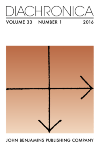
Diachronica
Unraveling the Threads of Linguistic ChangeDiachronica is a prestigious academic journal published by John Benjamins Publishing Co that specializes in the fields of Linguistics and Philosophy. Established in 1984, it has become a significant platform for researchers and scholars to disseminate their work on language change and diachronic linguistics, offering insights into the evolution of languages over time. With an impressive impact factor and recognized rankings within the Q2 category for both Linguistics and Language as well as Philosophy in 2023, Diachronica offers a valuable resource for academics interested in the interplay between historical linguistics and philosophical discourse. Although the journal is not open access, it ensures that its articles are rigorously peer-reviewed and of high academic quality. For researchers, professionals, and students looking to deepen their understanding of language dynamics, Diachronica stands out as an essential component of the scholarly dialogue surrounding linguistic change.